#Bolshevik revolution
Explore tagged Tumblr posts
Text

"La burguesía rica es nuestro enemigo irreconciliable: su riqueza se basa en nuestra pobreza, su alegría en nuestro sufrimiento."
I.V.Stalin
#stalin#vladimir lenin#lenin#bolshevik revolution#bolshevism#bolchevique#ussr#urss#communism#communist#communist party#communists#communist manifesto#comunismo#comunista#manifiesto comunista#partido comunista#revolução#revolucion#revolución#revolution#karl marx#marxist#marxism#marxismo#marxismo-leninismo#marxism-leninism#red october#october revolution#soviet
89 notes
·
View notes
Text
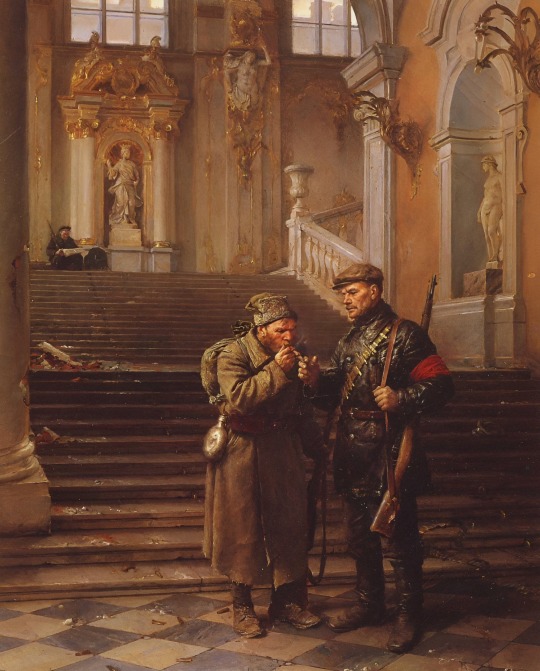
'The Winter Palace is taken!' — Soviet painting from 1954 showing two Bolsheviks smoking in the Winter Palace following its capture during the October Revolution.
#russian revolution#october revolution#bolshevik revolution#russian civil war#art#artist#drawing#russian empire#smoke#smoking#war history#photography#tumblr#revolution#circa 1917#ww1#wwi#mosin nagant#The Bolsheviks#world war 1#world war i#tumbler#Revolutions#russian history#russia#russian#history
92 notes
·
View notes
Text
#communism#socialism#leftism#marxism#leftist#communist#marxist#anti capitalism#socialist#dismantle capitalism#ernst thalmann#thalmann sonne seiner klasse#thalmann fuhrer seine klasse#marx#karl marx#communist party#lenin#leninist#leninism#workers power#soviet power#workers councils#revolution#bolshevik revolution#russian revolution#german revolution#rosa luxemburg#karl liebknecht#comintern#communist international
102 notes
·
View notes
Text
It’s Bolshevik Revolution Eve everyone! Remember to leave out your means of production and Communist Manifesto so Lenin can have a treat after he leaves you a Vanguard Party under your Soviet Tree.
#communism#socialism#Lenin#Leninism#bolshevik revolution#revolution#russian revolution#soviet union#Marx#marxism#marxism leninism
58 notes
·
View notes
Text

socialist party campaigning outfit for the day that's in it 🚩☭ ❤️
#bolshevik revolution#october revolution#rip to other elections but working for a marxist party is different
10 notes
·
View notes
Text
Dr. Zhivago was the coldest pimp ever. Cradling two bitches during the Bolshavick Revolution and surviving multiple fucking blizzards just to get pussy.
#dr zhivago#Russia#russian literature#literature#lol#player#pimp#comedy#russian lit memes#russian memes#communist#bolsheviks#bolshevik revolution#boris pasternak#david lean
6 notes
·
View notes
Text
The October revolution laid the foundation of a new culture, taking everybody into consideration, and for that very reason immediately acquiring international significance. Even supposing for a moment that owing to unfavourable circumstances and hostile blows the Soviet regime should be temporarily overthrown, the inexpungable imprint of the October revolution would nevertheless remain upon the whole future development of mankind.
Leon Trotsky , The History of the Russian Revolution
5 notes
·
View notes
Text


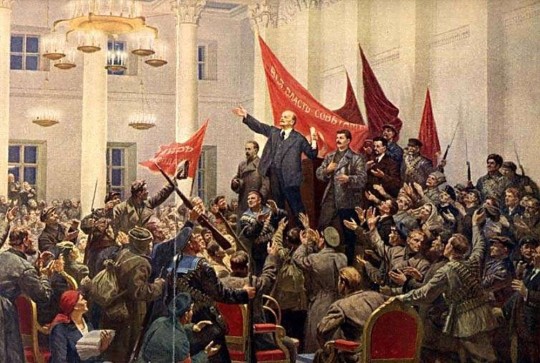

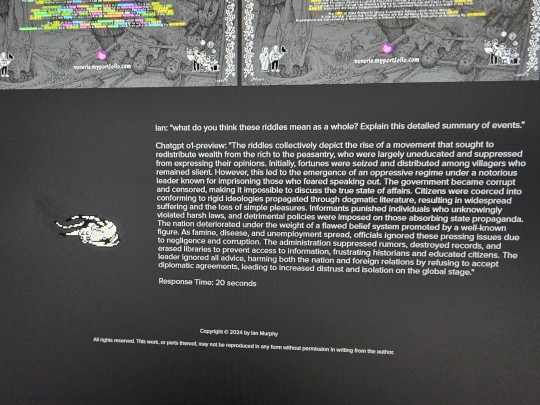
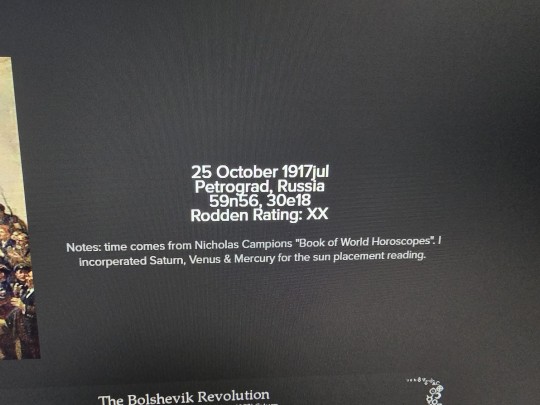
#ai generated#astrology#birth chart#chatgpt#cyclicaljigsaw#cyclicalpuzzle#large language model#machinelearning#projectveneris#strawberry#russia#ussr#cccp#communism#soviet union#ww2#cold war#bolshevik revolution#bolsheviks#stalin#joseph stalin
3 notes
·
View notes
Text










1956 Soviet film..a red woman sniper falls in love with a white officer during civil war in Russia after Bolshevik October revolution
1 note
·
View note
Text
short story 3
Red skined boy and grandfather
(i wanna continue what was on my last account so here it is)
"and grandpa?" asked the boy, "why do so many people starve to death, work from morning to night and still survive from day to day, while others do not work at all and even go on holiday all over the world?"
"you know, some have a higher education, a higher job position and therefore a salary. Those who get an education have the right to go where they want. They can afford it," replied the grandfather.
"and why doesn't everyone have a big enough salary to live the way they want?"
"because the uneducated don't deserve to have enough money to do whatever they want. They should have enough to put in their mouths. They don't deserve more. Their job doesn't require an education. Anyone can do their job."
"but grandpa!" the red skinned boy flinched, "that's not fair! we're all human after all! everyone deserves to live and not just survive. every job is important isn't it?"
"work? yes, but every worker is replaceable. As I say, anyone can do it. They didn't take the time for educating themselves and instead went to work, easily, without any effort. Having enough money to afford a piece of bread is all they deserve. Only educated people and entrepreneurs have the right to do what they want, because they built something. They built a career! "
the little boy, redder than before, got even angrier, "it's not fair! they're still people! and they built the place where you live. You wouldn't be able to do it yourself. You wouldn't even put concrete and masonry on the foundation of this house and bake tasty bread without practice. You wouldn't last a day in a brickyard and forge and create anything out of metal!"
Grandfather got mad, "get out of here and go to your room! I don't even want to see you today! You stand up for people who don't even reach our ankles and if you don't study, you'll end up like them and you won't stay here for even a minute! Get out of my sight!"
And so the little boy ran to his room and shouted how much he hated his grandfather's behavior, shouted that he was heartless and that he himself was worse than even the poorest person that could exist.
He shouted that education does not mean that he is something more than an ordinary person and that even though he has a company and several titles, even the simplest blacksmith who cannot read and write would make a more beautiful horseshoe than him.
The boy locked himself in the room where he used to live with the canary and started writing in his diary;
'dear diary, my only faithful companion left to me, I have so much to tell you... Today I realized that in order to help the common people, I have to hurt some even though I used to like them above all else and even though they are my blood, they have nothing to do with me.
I'd rather help a stranger who lives in poverty than my own family who opposes me and wants to reject me.
When the right time will become, the amount of blood huge as the sea will have to be spilled and I will be the one to betray those closest to me, who are called my family, who are at the same time so distant from me. Whoever says his family suffered because of me will be my opponent...'
#countryhumans soviet#countryhumans ussr#countryhumans soviet union#countryhumans#countryhumans rsfsr#кантрихуманс#ссср#short story#original story#story telling#story time#story#communism#communist#left wing#revolutionary#revolution#bolsheviks#Bolshevik revolution#leftist stories#communist stories#leftist#leftism#left is best#human rights#worker rights#workers of the world unite#workers#ch ussr#ussr
1 note
·
View note
Text
Gosh I think a musical about Sanzo Tsuda and the Otsu Incident would be really cool.
Nicholas II would open with a happy song about vacationing with his cousin and touring around Japan while also having undertones about how this a huge powertrip for him, getting to play in the culture of a country who is scared of him because of the military power he will one day inherit.
Cut then to Tsuda who would have a song about his slipping sanity with the chorus line providing haunting background vocals. The song would focus on his medals for heroism won in the Seinan War and how he would do anything to protect them. He then gets assigned to guard the streets that Nicholas II will go down and participates in a group number with Japanese reporters accusing the prince of coming to spy and speculating that the visit was a precursor to an invasion.
Cut to the actual incident which could be a reprise of all 3 of the previous songs with Tsuda and Nicholas singing back and forth and the haunting vocals emphasizing the same thing as Nicholas: that the Russians are subjugating the Japanese people. Tsuda then snaps and the attack happens in slow motion as a carefully choreographed dance number. Tsuda is taken into custody and Nicholas is taken to his hotel to be treated because he refuses a Japanese doctor.
Cut to then a huge group number to represent the 10,000 condolence telegrams sent by citizens and institutions that all melt away into a solo number by Yuko Hatakeyama in which she sings about the value of her life and how she hopes it can atone for Tsuda's act, ending with her suicide in front of the Kyoto Prefectural Office.
Next is another group number in which various lawyers argue about how to handle Tsuda's case. Some try to invoke Article 116 of the Criminal Code to execute Tsuda despite it not applying to a foreign crown prince while others argue for the actual charge of attempted murder which would carry life imprisonment at worst. The song is taken over by Kojima Iken, chief justice of the Supreme Court who fights back against his own cabinet and agrees on charging him with the actual crime, but does relent on trying Tsuda immediately instead of following procedure and allowing the case to make its way up the lower courts.
Tsuda gets another song in his prison cell where he laments his actions but at the same time questions whether he laments assaulting a complete stranger or merely laments doing it unsuccessfully. He wonders if he will keep his medals for heroism. Reporters arrive at his cell questioning the warden about his sanity, but are driven off and warned about the consequences of printing anything doubting that Tsuda was anything less than sane.
I feel like the court room scene to sentence Tsuda would have it's set set up and background music to make it seem like a musical number but instead its just a few quick lines sentencing him to prison for life.
Cut then to Nicholas being visited by Emperor Meiji where they sing a happy duet with the Emperor apologizing and Nicholas relishing it and promising to forgive him. Only once the Emperor leaves, he reveals that he will never forgive Japan.
Tsuda gets one last short song about how in less than a year, he's dying in prison and is still haunted by voices and wonders if he is still the hero he tried so hard to be. In his dying breath, he hopes that Japan will not be crushed by Russia.
This is followed with a reporter summarizing Nicholas becoming Tsar and advancing further east, forcing Japan to retaliate with the Russo-Japanese war, with Japan coming out victorious.
The final number would be Nicholas II during the Bolshevik revolution just before being executed. He would sing about how he did what he did for his family. How he thought he was invincible and thought he would leave his children an even stronger Russia than he had received. But all he had done was cost the lives of millions and had his family lose both Russia and their lives. And the stage would go black with his execution, ending the musical.
#long post#shut up zordon#otsu incident#Bolshevik revolution#should I tag this as Faberge eggs?#that is how I learned about this whole incident
1 note
·
View note
Text
"calling off revolution"?
maybe we came from different universes, but i don't recall there being a point in early 1917 where the revolution that hadn't even happened yet was "called off".
by the women's march on international women's day on march 8th (feb 23rd O.S), there had already been at least five days of protests and strikes (first from the workers at the putilov factory).
will agree that people understate the role of the women's march, but to say that everybody had given up until those women marched is just inaccurate, the women joined up with other protestors to form a larger bloc which would eventually force the tsar to abdicate.
in case you forgot, Stalin purged, browbeat, murdered, and exiled most of those "bolshiveks" when
you can make a statement on IWWD without turning it into a sterile, sectarian screed.
Happy birthday to the bolshiveks, menshiveks, SR's, social democrats and liberals being fucking cowards and calling off revolution, only to be shamed into action by the women of St. Petersburg who came out in force in the streets on March 8th, International Women's day.
They went from factory to factory, throwing rocks and heckling the passivity of the union men that had rolled over in the face of the Tsar, and the next day they too came out into the streets in a show of solidarity with their sisters and siblings.
International Women's day marks the start of the 1917 revolution. Within days, the liberal Duke Lavrov called off the soldiers, and a short time later the Tsar himself abdicated the Russian throne.
the bolshiveks (especially under Stalin) would slowly begin to push the importance of this day under the rug, as they betrayed the decades of work that Russian feminists had been doing both within and outside of their ranks. Upon it's founding (under great pressure from radical feminists), the USSR was the first country in Europe to legalize abortion, only to revoke that right within a matter of years under the command of Stalin.
People have a tendency to forget the Febuary revolution, saying that it matters little since the bolshiveks end up winning in the end - but it behooves us, regardless of our political tendencies to remember the bravery of the women of St. Petersburg, slowly left out of our historical accounts in favor of those that ironically never could have won without them.
So, to working women everywhere: remember the power in your hands. You have the power to topple empires.
Don't let anyone tell you otherwise.
If it happened once, it can happen again.
Happy International Women's day.
#dubious history#sectarianism#communist#communism#socialist#socialism#workers power#soviet power#workers councils#soviet#russian revolution#1917#marx#karl marx#marxism#lenin#leninist#leninism#bolsheviks#bolshevik#bolshevism#bolshevik revolution#leftist#leftism#leftwing#left wing#feminist#feminism#womens rights
116 notes
·
View notes
Text
Communist Dissidents in Early Soviet Russia
Communist Dissidents in Early Soviet Russia. Five documents translated and introduced by Simon Pirani This book gives voice to Russian communists who participated in the 1917 revolution, but found themselves at odds with the Communist Party as it consolidated its rule in the early 1920s. One Red army veteran demands action against corrupt officials; another mourns the dashed hopes of 1917 and…
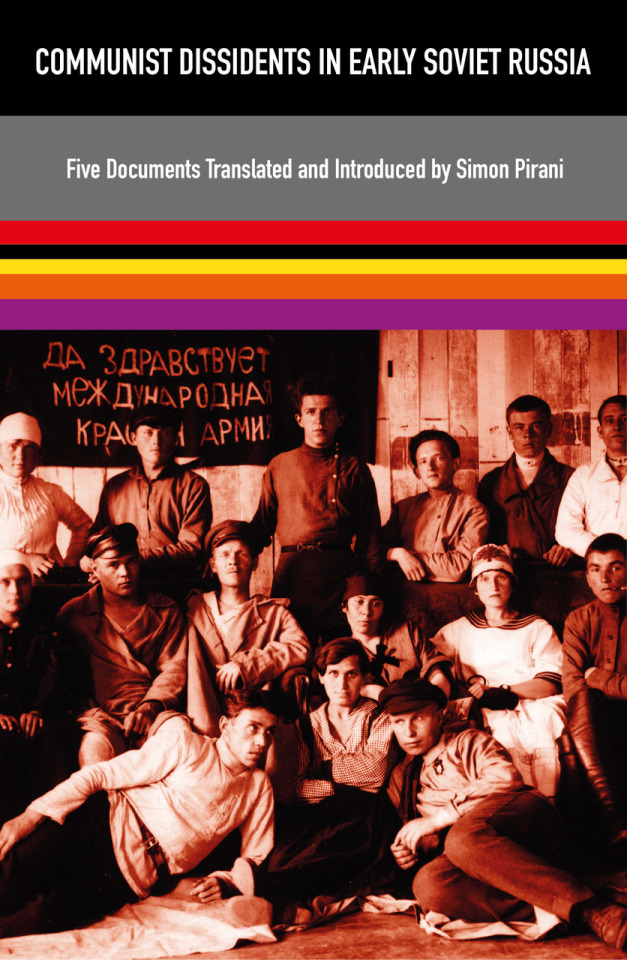
View On WordPress
#"Communist Dissidents in Early Soviet Russia"#Bolshevik Party#Bolshevik Revolution#Communist Party#leftist Soviet dissidents#Simon Pirani
1 note
·
View note
Text

I love communists, we've been acting like this for at least 107 years
#this is John Reed recounting the meeting of the Petrograd soviet at which he was present on November 7th 1917#ie. the very day of the Bolshevik Revolution#ten days that shook the world
311 notes
·
View notes
Text

Two kind of lefts:
#frev#french revolution#saint just#frev shitposting#karl marx#How do I explain to someone that Bolshevikism was practically born from there?
85 notes
·
View notes
Text
a children's book author paying to push through a bill disenfranchising the most vulnerable members of our society. a "car manufacturer" being in charge of "streamlining" the government. we are not just living in an oligarchy we are living in the worst kind of oligarchy where private citizens have circumvented even the notion of lobbying and can just directly influence policy based off their personal whims.
40 notes
·
View notes